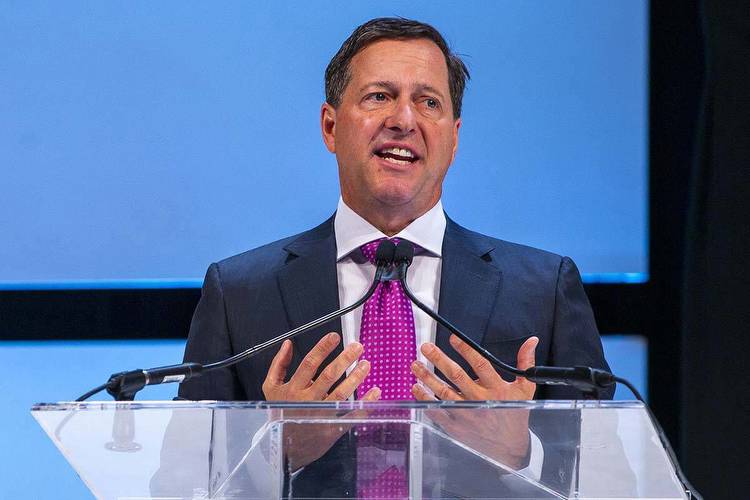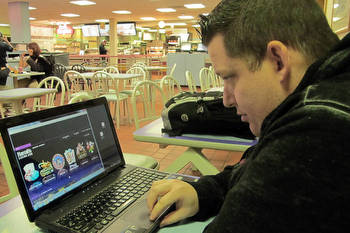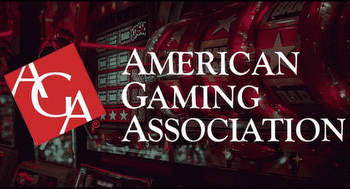AGA President and CEO Bill Miller seeks a crackdown against illegal gaming operators in speech in Las Vegas

A panel of gaming industry experts on Sunday discussed the challenges of targeting illegal operators nationwide, after the American Gaming Association’s leader appealed for a crackdown.
AGA President and CEO Bill Miller said several days earlier that illegal gaming operations have become the biggest — and costliest — challenge to legal gaming in the United States. Miller was speaking in Las Vegas Thursday as part of the four-day National Council of Legislators from Gaming States conference at Resorts World, which ended Sunday.
Between unregulated slot machines that look exactly like legal machines in licensed casinos, online casino games from unregulated illegal internet sites and bookmakers who take bets on behalf of unlicensed offshore online casinos, the U.S. legal gaming industry loses $44.2 billion a year in revenue resulting in states missing out on $13.2 billion annually in tax revenue.
Miller appealed to lawmakers attending the winter meeting of the NCLGS to encourage their attorneys general or U.S. attorneys in their jurisdictions to prosecute cases or pass more detailed legislation that would make it easier to prevent bad actors from taking bets from unsuspecting players.
He also warned against taking an easier approach to solving the problem — allowing illegal operators to become licensed.
Goal for indictments
“My goal is to get some indictments,” Miller said in Thursday’s opening keynote address. “An indictment would make it difficult for illegal operators to ever be licensed. We want to make these people unfit for licensure because they truly are unfit.”
Panelists Sunday responded with some ideas to educate the public about illegal operations and to track down and prosecute illegal operators.
Greg Brower, chief global compliance officer at Wynn Resorts Ltd. and a former U.S. attorney for the District of Nevada as well as a former Nevada legislator, said the lower tax revenue should get lawmakers’ attention. But another reason illegal gambling operations must be stopped, he said, is because the revenue produced is used “for human trafficking, narcotics trafficking, weapons trafficking, money laundering and a whole list of things that are in the wheelhouse” of the 93 U.S. attorneys in office.
“If nothing else appeals to the politicians out there whether its legislators or state AGs, the fact is this is an illegal activity that is depriving the state of tax revenue that everybody in the legislature wants,” Brower said. “Everyone in the legislature has his or her pet projects they want funded. Every state AG wants more money for what they need to accomplish in their mission and this is just a good example of money being left on the table. It could be put to use.”
Machines look like legal slots
Jeff Morris, vice president of public affairs and government relations for Pennsylvania-based Penn National Entertainment, said there has been a proliferation of skill-based slot-machine games in truck stops, bars, taverns and convenience stores and in the clubs of fraternal organizations.
Many operators of those illegal games offer odds that are worse than those in regulated Nevada casinos with 25 percent holds as opposed to the average 7 percent in regulated locations. They offer no consumer protections, no oversight of underage gambling, no responsible gambling programs and rarely have security cameras that can benefit consumers in a player dispute.
“They’re hiding in plain sight and look exactly like a legal licensed slot machine,” Morris said. “For law enforcement, it’s like whac-a-mole because as soon as one is discovered and removed, another one appears in its place.”
Panelist Greg Hebert, director of the Gaming Division of the Louisiana Attorney General’s Office, said fighting illegal operators has always been a consumer protection issue. He said steps are being taken in Louisiana to educate consumers.
“We need to get the message out to consumers that the regulated product is the only product they should use, and tell them how unregulated entities can theoretically cheat them out of their money, how there’s no protection in place for those who might want to place themselves on an exclusion list or limit how much they gamble during a certain time period,” Hebert said.
But Danny DiRienzo, senior director of government relations for GeoComply and a former U.S. Secret Service agent, said law enforcement officers get discouraged when their lengthy investigations go nowhere.
“The last thing any law enforcement officer wants to do is investigate a case for two years only to have a prosecutor say, ‘We’re not filing charges.’ It’s just a waste of time,” DiRienzo said. “Getting prosecutorial interest is key and that comes through education.”
The AGA’s Miller sent letters to U.S. attorneys encouraging prosecutions.
“The issues around money laundering and organized crime are very powerful motivators for people in the U.S. Attorney’s Office,” Miller said. “My absolute belief is that people in the illegal market want to become so annoying that you in your state legislatures will just decide, ‘They’re already here. We can’t get rid of them so we’re just going to wave a wand and legalize them in the same way we legalize the rest of the industry.’ I think that’s dead wrong. An indictment will make it very difficult for someone in that gray market to ever get a license.”
rvelotta@reviewjournal.com or 702-477-3893. Follow @RickVelotta on Twitter.

































